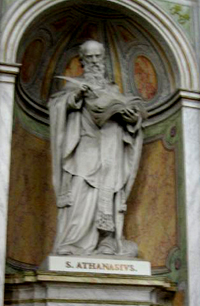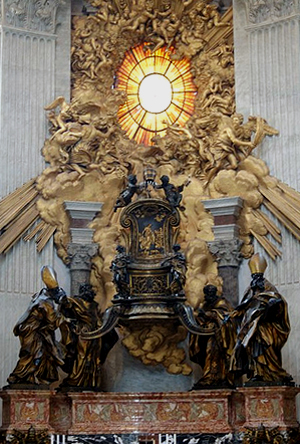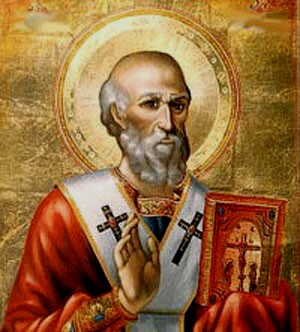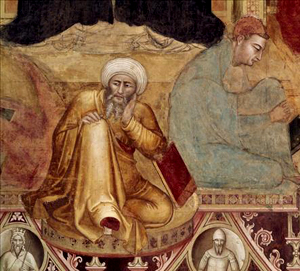To comment please open your gmail account or use my email address or Messenger. Significant Facebook comments on matters of faith and morals will also be posted on this page.

Athanasius overcoming Arius - Rubens (Modello)
"You are the ones who are happy: you who remain within the church by your faith, who hold firmly to the foundations of the Faith which has come down to you from apostolic Tradition.
"And if an execrable jealousy has tried to shake it on a number of occasions, it has not succeeded. They are the ones who have broken away from it in the present crisis."
Not many Kiwi Catholics know that the Antipope Jorge Mario Bergoglio has cancelled the Traditional Latin Mass. Or tried to.
Many don't even know there's such a thing as the Traditional Latin Mass and that it was the ONLY Mass throughout Church history, right up until the Second Vatican Council. Many more don't know that the TLM has always been celebrated in New Zealand, but that now 'Pope Francis' wants it to stop, and wants the bishops to make sure it stops, and that most NZ bishops are allowing it to continue, probably because they can't see any good reason why it shouldn't.
Except for Cardinal John Dew and Bishop Emeritus Peter Cullinane, who are in the business of stopping it in the Wellington Archdiocese, where it's been celebrated every Sunday in the little Manawatu town of Ashhurst for 12 years.
The TLM parishioners of St Columba's are currently being catechised by Bishop Cullinane in a series of talks following Mass on the first Sundays of October, November and Dccember, following Mass, on the reasons why 'Pope Francis' wants to put a stop to it, and why +Dew and +Cullinane are letting it continue until the first Sunday in December, so that the latter can explain why it Must Stop.
One of the TLM parishioners, a reader of this blog, suggests that the letter quoted above, written by St Athanasius for the faithful lay people who opposed the great Arian heresy in the middle of the fourth century, is just the thing for St Columba's little flock to read right now.
Read on:
"May God console you! ...What saddens you ...is the fact that others have occupied the churches by violence, while during this time you are on the outside. It is a fact that they have the premises - but you have the apostolic Faith.
They can occupy our churches, but they are outside the true Faith. You remain outside the places of worship, but the Faith dwells within you. Let us consider: what is more important, the place or the Faith? The true Faith, obviously. Who has lost and who has won in this struggle - the one who keeps the premises or the one who keeps the Faith?
True, the premises are good when the apostolic Faith is preached there; they are holy if everything takes place there in a holy way ...You are the ones who are happy: you who remain within the church by your faith, who hold firmly to the foundations of the Faith which has come down to you from apostolic Tradition. And if an execrable jealousy has tried to shake it on a number of occasions, it has not succeeded. They are the ones who have broken away from it in the present crisis.
No one, ever, will prevail against your faith, beloved brothers. And we believe that God will give us our churches back some day.
Thus, the more violently they try to occupy the places of worship, the more they separate themselves from the Church. They claim that they represent the Church; but in reality, they are the ones who are expelling themselves from it and going astray.
Even if Catholics faithful to Tradition are reduced to a handful, they are the ones who are the true Church of Jesus Christ."
Now, as a backgrounder, a piece on St Athanasius by the late Professor Prof. Plinio Corrêa de Oliveira:
I just finished reading a synopsis of the life of St. Athanasius (c. 296-373), who was one of the greatest saints of the Church. Some aspects of his life that I did not know caught my attention, and they seemed appropriate to address with you today.
One of the most nefarious heresies of History expanded precisely at the time of St. Athanasius and Constantine: it was the heresy of Arianism. The followers of Arius affirmed that Our Lord Jesus Christ had only a human nature, and was not God. They admitted that He was an extraordinary man, but not God. This heresy, as you can see, implied the negation of the entire Catholic Religion, because to reduce Our Lord to a mere man is to deny almost all the dogmas of the Catholic Church. The Arians were very powerful. They quickly spread from the Mediterranean Basin and, by means of intrigues and defamations at which they excelled, they attained considerable influence in the imperial court and dragged an enormous number of the faithful, priests and Bishops along with them. Some time later, St. Jerome, commenting on how fast that heresy had spread, declared that one day the whole world woke up and realized that it had become Arian. The heresy conquered everything, everywhere, with lightning speed. In the fight against Arianism, the great giant was St. Athanasius. He was the Patriarch Archbishop of Alexandria, one of the most important episcopal sees of the time. Because of the Arian plots against him, he was obliged to flee the city five times, spending 17 of the 46 years of his episcopate in exile. Some of these exiles were caused by imperial decrees against him, due to Arian intrigues in the court. He was not only persecuted, but also threatened with death in that tremendous fight in which he was involved. Some episodes of this fight are not well-known. We know about his doctrinal quarrel with the Arians. We know less about some of the hunt and chase episodes in his battle against them. In the life of this great saint, even small anecdotes are worthwhile to know so that we might realize how much the position of resistance against heresy demands.
Another time the trial was less difficult, but also impressive. He had to flee through the deserts of Egypt and the only secure place he could find to hide was his father’s grave. He spent four months there. It is ghoulish. The sensibility of any man is horrified at this perspective. He was a great saint, he conquered this repugnance. To evaluate his suffering we must consider the self-mastery this signified. At the end of those four months, he returned to the battle. His principal combat against Arianism was made through his sermons; his words were taken down, copied and spread throughout the Roman Empire. On another occasion he was summoned to appear before a council of Arian bishops in the city of Tyre. He declared he would not go because the bishops were heretics. He did not recognize those heretics as Catholics and desired no communion with them. However, he received an order from the Emperor in the form of a decree obliging him to go and defend himself against the accusations of the heretics. He was forced to go, not because he accepted that assembly as legitimate, but because the imperial authority obliged him. So, he went and he fought against that pseudo-council, that gathering of heretics.
At that meeting, different calumnies were made against the Saint and a clamorous hatred rose up against him. When silence was established, a prostitute was brought forward as a witness, who told the assembly that she had become wealthy thanks to the payments of St. Athanasius for her infamous services. She also affirmed that she was with him during his long absences from Alexandria, and had witnessed all kinds of sexual depravations he committed. As she spoke those lies, the Arians bishops began to demand even louder that he be deposed and imprisoned. Here we can see how at times heretics pretend to be zealous for good customs in order to persecute true Catholics. Facing that raucous storm of accusations, St. Athanasius, giving proof of his high intelligence, said nothing. He remained serene and let those around him to continue shouting. He whispered something in the ear of the priest who accompanied him, and the latter drew near the prostitute. When she paused in her vilifications, the priest addressed her in a loud voice, pretending that he was St. Athanasius: “Are you sure that you were really with me on this and that occasion, and that I did this and that?” The woman, who obviously knew neither the priest nor St. Athanasius, fell into the trap and answered: “Yes, I am sure that you did this with me, and I am sure that it was you, Athanasius.” “Do you swear it?” “Yes, I swear it!” The imposture of that woman became so flagrant that the assembly reacted as all of you did – it broke out into laughter. Those accusations became so ridiculous that the majority of the bishops wanted to disperse the council. But some of the more fanatical heretics convinced the others to stay and listen to more charges against St. Athanasius. We can see how far the bad faith of those heretics went. Don’t think that this was an isolated occasion in the past: the progressivists today have the same bad faith against true Catholics. Any honest man would realize that after the credibility of the accusers had been destroyed by the prostitute’s lies, whatever more the bishops might say would be unreliable. But, since they were not honest men but heretics, they continued.
Again St. Athanasius remained serene and noticed a bishop in the assembly sitting in a secondary place with his face hidden. Then, he recognized that man – something only possible with divine assistance. He walked to a spot near that bishop and asked the accuser: “So, you say that bishop X is dead?” “He is,” was the reply. Then, St. Athanasius pulled off the hood covering the head of that man near him and said: “Here is bishop X, perfectly alive.” He turned to the assembly and addressed them: “God has given us but two hands. Could you please ask bishop X to show us his hands?” The bishop complied, showing his two hands. Then, St. Athanasius told the assembly: “Now, since he has his two hands, you must decide where on his body you would like to place his third hand…” It was a second brilliant victory. Do you think that this stopped the heretics? No, they continued with their defamations of St. Athanasius. Notwithstanding, the council became so demoralized that it was closed. Another time, imperial troops crossed the path of St. Athanasius walking in the desert. The commander asked him: “Do you know Athanasius?” He answered: “Yes, I do.” The commander: “Do you know where he is?” The Saint: “Yes, he is not far from here.” As the troops began to search the area, he hid himself. St. Athanasius, who was a saint, a great doctor of the Church, had a horror of the lie. In this case, he did not lie; what he did was to not tell the whole truth, which anyone is entitled to do in his legitimate defense. He told a half-truth that saved him from imprisonment. Again, the incident shows his agility and great presence of mind, illustrating the richness of his personality. Constantine the Great, the same emperor who had liberated the Church with his Edict of Milan in 313, later in his life became entangled in the Arian intrigues. Contrary to his former support, he took a position against St. Athanasius and exiled him to Gaul. St. Athanasius told him: “You forbid me to return to my patriarchal throne and support a heretic. Shortly you will give an account of this to God.” He went to Gaul, remained there for a while, and then traveled to Rome to justify himself before the Pope, who gave him his full support. News of Constantine’s death soon reached him.
With his principal enemy Arius and the one who protected him both dead, St. Athanasius returned to Alexandria. His life would not be tranquil, however. New persecutions would start and continue throughout almost his whole life. The people of Alexandria loved him, but the rotten ecclesiastical leaders hated him. He was very well received by the people, so well received that an expression became proverbial: “To be welcomed like Athanasius.” The putrid ecclesiastical heads, however, never stopped spreading calumnies and defamations against him. Shortly after his return to Alexandria, almost all the bishops apostatized and embraced semi-Arianism, and fidelity to the Church was maintained by the simple people. That reception of St. Athanasius was symptomatic of the spiritual health of both the cupola and the grassroots. These anecdotes from the life of St. Athanasius should encourage us to resist all kinds of heresies that make up part of the great heresy of Progressivism. Arianism in many ways was a prefigure of Progressivism, just as our fight is a post-figure of the fight led by St. Athanasius. The fidelity of the simple people when most of the bishops went astray should reinforce our conviction to continue defending the same orthodoxy the Church always taught. This similarity of vocation should lead us to have a special devotion to St. Athanasius and ask him to help us, protect us and enlighten us in the fulfillment of our anti-Progressivist mission. |
![]()





Anon:
ReplyDeleteThanks Julia, a truly inspiring read and inspiration for us fighting for our faith against our modernist hierarchy.
Anon:
ReplyDeleteI see significant parallels between Arianism in the 300's and the current trends in the Church in the third millennium. Arianism denied the divinity of Christ outright, the modernists are diluting the divinity of Christ in subtle steps, more the boiled frog approach. The signs are there: the removal of kneelers, the moving away of the tabernacle, discouragement of genuflecting, encouragement to stand and not kneel, receiving in the hand and not on the tongue, the replacement of reverence near the tabernacle by noisy socialising, diminishing of the role of priests as Christ's representative to just another servant, encouragement of laity in place of priests, killing the Latin Mass.
Where is our St Athanasius of the third millenium? St Athanasius, pray for us.
O so well put. Keep your eyes on Bishop Athernatius Schnider and Cardinal Burke.
ReplyDelete